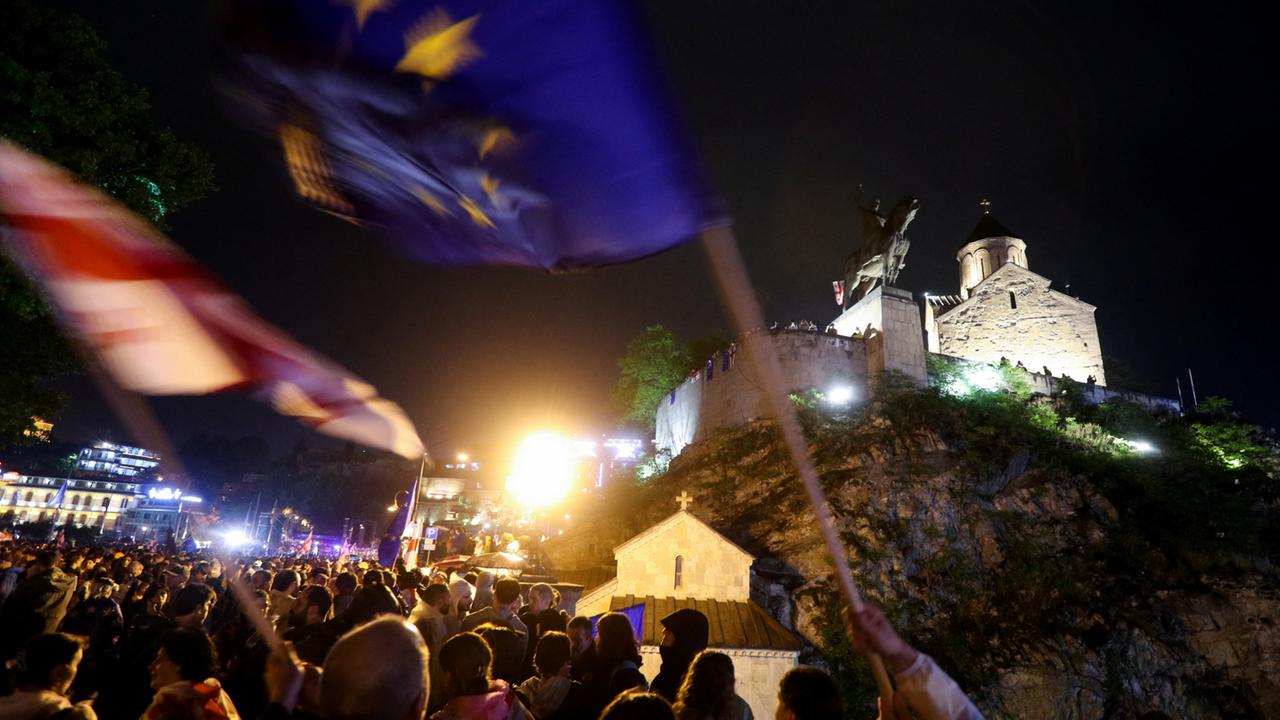A decision between war and peace, between the EU and Russia – the government and opposition in Georgia today describe the parliamentary election as an election of fate. Many people, on the other hand, are worried about their economic situation.
“Two more days and two hours until Georgia is free!” wrote a politician from the opposition party Droa (Translated: It's time!) on Thursday on X. There is great hope in civil society and in the liberal opposition that the parliamentary election brought about the end of the ruling Georgian Dream party in power.
As an argument, they cite the number of participants in protests against the government. Most recently, on October 20, tens of thousands took part in a demonstration for Georgia's path to the EU. Surveys have shown stable approval rates of 80 percent for joining the EU for years.
Accordingly, the liberal opposition describes the parliamentary vote as a fateful choice between the EU and its northern neighbor Russia, to which businessman Bidzina Ivanishvili's ruling party is committed. He made his fortune in Russia in the 1990s and in his speeches gives the impression that he wants to accommodate ruler Vladimir Putin. He also passed a law on “foreign influence” against civil society organizations, a similar law that has existed in Russia since 2012.
Ivanishvili accuses the West of wanting to push Georgia into a war against Russia; only his party can keep the peace. In doing so, he touches on deep fears among the population. His goal: a two-thirds constitutional majority for the Georgian Dream in parliament.
High-ranking members of his party warn that the opposition wants to bring about a coup with the backing of the West. The opposition fears election manipulation and complains about pressure on voters critical of the government and attacks on their politicians.
Height discontent with all parties
It is unclear what the mood among the population actually is. Pro-government and opposition media publish surveys that see majorities for their side. The reputable institute Caucasus Resource Research Center (CRRC) last published relevant data a year ago. At that time, 62 percent said that none of the parties represented their interests. 52 percent did not feel represented by members of parliament.
In a pre-election study by a US institute named after the late US Senator John McCain, unpublished survey results from non-partisan organizations are reported, according to which the governing party can count on a “healthy majority”. The problem is that the liberal parties have not formed a bloc despite a five percent hurdle.
Rather, there are two groups of parties with politicians from the former ruling UNM party of ex-President Mikheil Saakashvili, who is in prison for, among other things, abuse of power. There is also a neutral alliance between the two political poles, as well as the “For Georgia” party of former Prime Minister Giorgi Gacharia. The government has declared them all opponents and is threatening to ban them.
Bypassing people's worries
What serious surveys have shown for years: All parties neglect the issues that matter to people – their economic and social situation. Ivanishvili's party has made little change to the massive deregulation implemented by Saakashvili. The lengthy implementation of the EU Association Agreement, which came into force in 2016, has so far brought little improvement, especially in working life.
This is reflected in increasingly frequent strikes. On Thursday, residents of the village of Shukruti ended their weeks of protests and hunger strikes – without results. They had protested that their village was falling apart as a result of mining activities and that they were not even receiving compensation. The ruling party finally agreed to mediate with the mining company a week before the parliamentary election, but no agreement was reached. The villagers left the capital in frustration.
EU in bad light
In July, numerous employees of the Swedish casino operator Evolution Georgia went on strike for better working conditions and against the sexist attitude of the management. When the Swedish embassy in Georgia praised the company for its working conditions in a Facebook post, it caused widespread outrage. Other European companies in the service sector, such as the food delivery company Bolt from Estonia, also often have strikes due to low wages and poor working conditions.
The EU is a difficult market for Georgia's third important sector, agriculture. Even the producers of the widely popular Georgian wine are having a hard time in the saturated European market. It is easier – and with fewer quality requirements – to sell wine to China and Russia.
That's why warnings from the ruling party that the pro-European parties could impose sanctions against Russia, even though they haven't announced it at all, are falling on fertile ground. However, the liberal parties do not approach voters with convincing concepts for improving the economic and social situation.
Election outcome open
Given the high level of dissatisfaction with all parties and the great indecision among voters, the outcome seems open – and is controversial even before the polling stations open, as the ruling party on the one hand and the liberal opposition, including President Salome Zurabishvili, on the other hand, are predicting the defeat of their respective opponents and others Don't want to accept results.
Statements from the government suggest that protests will be suppressed with violence. Ivanishvili has announced a legal approach modeled on the Nuremberg Trials in Germany.
Foreign influence
A turbulent domestic political situation is therefore to be expected, which would make foreign influence easier. The head of the Russian foreign secret service SWR, Sergei Naryschkin, commented several times on the upcoming election in Georgia. He accused the USA of trying to prevent the Georgian Dream from continuing in office. In August, he said Russia would prevent another “color revolution,” like several in Russia's neighborhood in the early 2000s. The US State Department categorically rejected this.
Investigative journalist Christo Grozev now reported that he had received hacked messages from SWR. It would propose “radical measures” to prevent a change of power brought about by peaceful protests like in Armenia in 2018. According to Grozev, what these measures should consist of is not explained in more detail. He expects brutal action like in Belarus. Opposition politicians in Georgia have also expressed concerns about a scenario like that in Belarus.
Björn Blaschke, ARD Moscow, currently Tbilisi, tagesschau, October 26, 2024 11:14 a.m





